When the best thing you can do during a global pandemic is stay home, away from all the people who make up your real-life communities, books might be the best company you can get. And, like the various kinds of human relationships, different kinds of books may each fulfill distinct needs in our lives. We want to be comforted, consoled, and distracted, but also challenged, enriched, instructed, and maybe even scared a little. Here are the seven kinds of books that will see you through a whole gamut of emotions while COVID-19 sweeps across the globe.
1) Dystopian Fiction
Global pandemics, resource shortages, shuttered businesses, and government actions (and inactions) that reinforce massive social divides—dystopian fiction feels more relevant than ever at times like this. If you’re a bit of a masochist like me, then that’s the exact kind of fiction you’re seeking out. I just finished Station Eleven by Emily St. John Mandel, a brilliant, unsettling novel about a group of musicians and actors navigating a desolate, post-pandemic world, clinging to the idea that there’s more to life than mere survival. Here’s a particularly striking bit of dialogue:
“It just doesn’t make sense,” Elizabeth insisted. “Are we supposed to believe that civilization has just come to an end?”
“Well,” Clark offered, “it was always a little fragile, wouldn’t you say?”
Next up? Severance by Ling Ma. In this genre I can also recommend The Road by Cormac McCarthy and The Parable of the Sower by Octavia E. Butler.
Counterpoint: maybe wait a few months? https://t.co/mZduMr022L
— Emily St. J. Mandel (@EmilyMandel) March 11, 2020
2) Comfort Reads
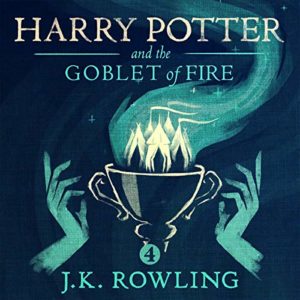 As you’re all tired of hearing, we’re living through terrifying, unprecedented times, and this will have most of us reaching for comfort. Fiction can offer the perfect escape, whether that take the form of a childhood favorite or a fluffy romance with a guaranteed happily ever after. My current comfort pick is Harry Potter and the Goblet of Fire on audio, narrated by Jim Dale. Different things stick out to me with each reread, and this time around it’s the Triwizard Tournament as a symbol of international cooperation (until 2021, Summer Olympics!). In the realm of feel-good fiction, I can also recommend When We Were Vikings by Andrew David MacDonald (“up-lit” at its finest), Less by Andrew Sean Greer (armchair travel served with a side of humor), and A Gentleman in Moscow by Amor Towles (has there ever been a better time to read about a charming Russian count stuck inside the same building for decades?).
As you’re all tired of hearing, we’re living through terrifying, unprecedented times, and this will have most of us reaching for comfort. Fiction can offer the perfect escape, whether that take the form of a childhood favorite or a fluffy romance with a guaranteed happily ever after. My current comfort pick is Harry Potter and the Goblet of Fire on audio, narrated by Jim Dale. Different things stick out to me with each reread, and this time around it’s the Triwizard Tournament as a symbol of international cooperation (until 2021, Summer Olympics!). In the realm of feel-good fiction, I can also recommend When We Were Vikings by Andrew David MacDonald (“up-lit” at its finest), Less by Andrew Sean Greer (armchair travel served with a side of humor), and A Gentleman in Moscow by Amor Towles (has there ever been a better time to read about a charming Russian count stuck inside the same building for decades?).
3) Classics
Now’s your chance to finally read those low priority bucket list classics. You know, the ones that keep meandering to the bottom of your TBR, the dreaded realm of “someday, if I have the time.” That someday is now. You suddenly have the time, and you may find they’re more relevant to the present than you expected. Exhibit A: Twitter’s newfound appreciation for Jane Austen:
I have never before so understood the desire of Jane Austen characters to go on daily long walks through the country.
— Elyse (@champs_elyse) March 21, 2020
nothing like living through a pandemic to make you understand why Jane Austen’s original readers swooned when Mr Darcy said, “I trust your family is in good health.”
— The Library Owl 🧙♀️🦉📚 (@SketchesbyBoze) March 26, 2020
I finally read Things Fall Apart by Chinua Achebe at my boyfriend’s recommendation. While at first I didn’t understand why he thought now would be a good time for me to read this particular classic, it turns out the novel stars a strongman terrified of being perceived as weak (who’s also notorious for his abuse of women) and offers a cutting critique of how we view and treat people we deem as Other. So there’s that. Next classic in the queue? The Master and the Margarita, because Lit Hub told me to and because I’m self-isolating with a roommate who said, and I quote, “The Master and the Margarita is…my book.” Turns out my motivation to read classic literature skyrockets when I’m stuck inside with someone who I can force to discuss it with me.
See also: How Pride and Prejudice Characters Would React to Social Distancing
4) Current Affairs/Social Science
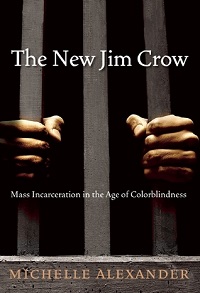 Many have pointed out that this pandemic is revealing the cracks (and full-on gaps) in our social and economic systems: healthcare, education, housing, disaster relief, criminal justice, etc. These are not new problems, but they are exacerbated in times of crisis. With public health officials warning that prisons create the ideal environment for outbreaks to spread, and advocates and lawmakers from across the political divide urging for the release of at-risk and non-violent offenders nationwide, now might be the moment to read up on the prison industrial complex. I’ll be reading law professor Michelle Alexander’s The New Jim Crow, which promises a searing look at the history of mass incarceration and its disproportionate targeting of black men. It’s one to make you rethink comparing your self-isolation to incarceration and give you new insight and empathy into the plight of this oft-overlooked population facing years (or a lifetime) on lockdown.
Many have pointed out that this pandemic is revealing the cracks (and full-on gaps) in our social and economic systems: healthcare, education, housing, disaster relief, criminal justice, etc. These are not new problems, but they are exacerbated in times of crisis. With public health officials warning that prisons create the ideal environment for outbreaks to spread, and advocates and lawmakers from across the political divide urging for the release of at-risk and non-violent offenders nationwide, now might be the moment to read up on the prison industrial complex. I’ll be reading law professor Michelle Alexander’s The New Jim Crow, which promises a searing look at the history of mass incarceration and its disproportionate targeting of black men. It’s one to make you rethink comparing your self-isolation to incarceration and give you new insight and empathy into the plight of this oft-overlooked population facing years (or a lifetime) on lockdown.
5) Cookbooks
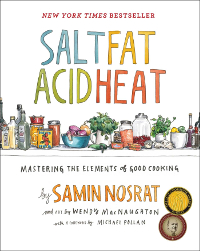 Has being home all day given you new inspiration for your capabilities as a home chef? Now’s the time to dust off those aspirational cookbooks and actually see what they have to offer. If you’re ordering new ones, you may be delightfully surprised to find that your favorite restaurants actually have their own cookbook, as is the case with Philadelphia’s Zahav, New York’s Momofuku, L.A.’s Guerrilla Tacos, and even the international chain Shake Shack. I gained a new appreciation for cookbooks as a literary medium after interning for two agents who represented cookbook authors, and this was my takeaway: if you just need a quick basic recipe, let Google direct you to blogs with the best SEO, but if you want an education in the science, history, and/or culture of the food you’re preparing, read a cookbook—and actually read it. Savor the stories right alongside the recipes. I’m finally dipping in to Salt, Fat, Acid, Heat by Samin Nosrat, which starts with 200 pages discussing these four elements in-depth.
Has being home all day given you new inspiration for your capabilities as a home chef? Now’s the time to dust off those aspirational cookbooks and actually see what they have to offer. If you’re ordering new ones, you may be delightfully surprised to find that your favorite restaurants actually have their own cookbook, as is the case with Philadelphia’s Zahav, New York’s Momofuku, L.A.’s Guerrilla Tacos, and even the international chain Shake Shack. I gained a new appreciation for cookbooks as a literary medium after interning for two agents who represented cookbook authors, and this was my takeaway: if you just need a quick basic recipe, let Google direct you to blogs with the best SEO, but if you want an education in the science, history, and/or culture of the food you’re preparing, read a cookbook—and actually read it. Savor the stories right alongside the recipes. I’m finally dipping in to Salt, Fat, Acid, Heat by Samin Nosrat, which starts with 200 pages discussing these four elements in-depth.
See also: 12 of the Best Cookbooks for Quarantine Cooking and Prep
6) Introspective Nonfiction
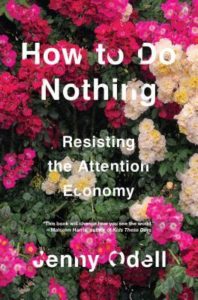 If you’re spending a lot more time alone with your thoughts these days, you might gravitate toward nonfiction that encourages you to reflect on your life, your space, and your habits. This might take the form of an appropriately-themed essay collection like The Lonely City: Adventures in the Art of Being Alone by Olivia Laing. Or, you might pick up Alain de Botton’s The Architecture of Happiness, a book that is nominally about architecture but really about how the physical spaces we inhabit influence our emotional state, a concept that might hit differently for everyone listening to government directives to stay home. And for those of us feeling overwhelmed by the pressure to create and getting sucked down social media vortexes that leave us feeling worse than when we started scrolling, the perfect fix might be Jenny Odell’s How to Do Nothing: Resisting the Attention Economy.
If you’re spending a lot more time alone with your thoughts these days, you might gravitate toward nonfiction that encourages you to reflect on your life, your space, and your habits. This might take the form of an appropriately-themed essay collection like The Lonely City: Adventures in the Art of Being Alone by Olivia Laing. Or, you might pick up Alain de Botton’s The Architecture of Happiness, a book that is nominally about architecture but really about how the physical spaces we inhabit influence our emotional state, a concept that might hit differently for everyone listening to government directives to stay home. And for those of us feeling overwhelmed by the pressure to create and getting sucked down social media vortexes that leave us feeling worse than when we started scrolling, the perfect fix might be Jenny Odell’s How to Do Nothing: Resisting the Attention Economy.
7) Doorstoppers
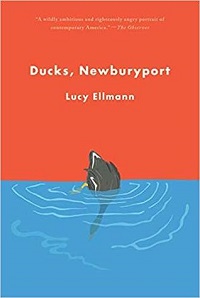 Is self-isolation when you’ll finally tackle The Goldfinch (771 pages)? A Little Life (832 pages)? Jonathan Strange and Mr. Norrell (1024 pages)? Or possibly Ducks, Newburyport, that 1040 page tome on one woman’s musings about the state of the world written almost entirely as a single sentence? I’m not saying I’ll be reading from this category myself, friends—I’m just saying I no longer have the excuse that I “can’t read that big book” because it’s “too heavy to carry on the subway” anymore. If you need help choosing a doorstopper, there’s a quiz for that.
Is self-isolation when you’ll finally tackle The Goldfinch (771 pages)? A Little Life (832 pages)? Jonathan Strange and Mr. Norrell (1024 pages)? Or possibly Ducks, Newburyport, that 1040 page tome on one woman’s musings about the state of the world written almost entirely as a single sentence? I’m not saying I’ll be reading from this category myself, friends—I’m just saying I no longer have the excuse that I “can’t read that big book” because it’s “too heavy to carry on the subway” anymore. If you need help choosing a doorstopper, there’s a quiz for that.
Let’s be honest, in quarantine none of us will be plowing through Ducks, Newburyport; we will all be checking this infernal app to see how much worse the world has gotten since we checked it five minutes ago
— Anton Bogomazov (@genrebending) March 14, 2020
Source : The 7 Kinds of Books You Read During a Global Pandemic









